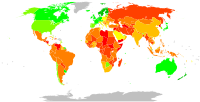
Photo from wikipedia
ABSTRACT This paper studies the effect of the type of government on responsibility attribution for corruption scandals. Most studies on corruption voting have assumed that voters punish all kinds of… Click to show full abstract
ABSTRACT This paper studies the effect of the type of government on responsibility attribution for corruption scandals. Most studies on corruption voting have assumed that voters punish all kinds of governments. This article challenges this assumption by distinguishing between two types of governments: single-party majority governments and minority/coalition governments. This hypothesis is tested using data from the 2011 Spanish local elections. Our findings reveal that the effect of coalition governments on corruption voting is not statistically different than majority ones. However, when we differentiate between welfare-enhancing and welfare decreasing corruption, we find that welfare-decreasing corruption has a clear negative effect on the electoral performance of the mayor’s party when it impacts single-party majority governments, but not when the mayor needs the support of other parties (minority or coalition governments).
Journal Title: Local Government Studies
Year Published: 2019
Link to full text (if available)
Share on Social Media: Sign Up to like & get
recommendations!